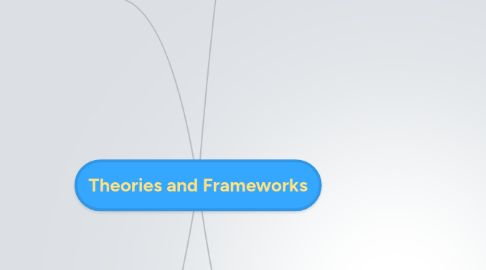
1. Social Construction of Technology
1.1. Human Actions and demands shape the evolution of technology
1.1.1. success of a technology is socially determined no matter its quality
1.1.2. Affects how we consider teaching technology/the learning process
2. Media Ecology
2.1. Media Ecology is the study of how the media serves to affect in turn, the thoughts and actions of people and society, in a "soft" way
2.1.1. The Specific medium makes a big difference
2.1.1.1. The way we communicate often determines what we actually say
2.1.1.2. Choosing the right medium can be a great way to deal with cognitive load issues
2.1.1.2.1. Allows for customized learning More engaged learning = more meaningful learning
3. Technology Learning Theories
4. Philosophy of Teachnology
4.1. My personal values and ideologies of how technology can be used in the classroom for teaching.
4.1.1. A good tool to write down personal Teachnology statements, and reflecting on them from time to time as I lessonplan
5. Constructivism
5.1. Learning is a building of connections by actively interacting with the environment
5.1.1. (Constructing one's own knowledge from one's own experiences)
5.1.1.1. Discovery Learning
5.1.1.2. Case-based learning
5.1.1.3. Collaborative learning
5.1.1.4. Active Learning
5.1.1.5. Zone of Proximal Development
5.1.1.5.1. Students are directed to tasks just outside of their zone of comfortable ability, pushing them to develop in a positive, constructive manner
5.1.1.5.2. This gives the students a better opportunity for meaningful education, making it individualized to their interests and needs, and tailoring the method by which they learn as well.
5.2. Criticisms of Constructivism
5.2.1. Time consuming; subjective learning; difficult assessment; Impractical without prior/knowledge
6. Connectivism
6.1. Idea that knowledge exists in networks that you create
6.1.1. Learning occurs by building building connections and knowing how to find information
6.1.1.1. If learning and knowledge are based on one's ability to navigate social connections with ease, what does this say for students who don't have access to this kind of connectivity
6.1.1.1.1. FNMI, recent immigrants, Special Education students, lower socioeconomic class students etc. (Anyone who may have limited access to the same resources as the general population)
6.1.2. "knowledge is distributed across a network of connections, and therefore that learning consists of the ability to construct and traverse those networks"
6.1.2.1. Knowledge is literally the set of connections formed by actions and experience
6.1.2.2. Currency is the intent of all connectivist learning activities
6.1.2.3. Learning is a process of connecting specialized nodes of info sources
6.1.2.4. Ability to see connections between fields, ideas and concepts is a core skill
6.2. Criticisms of Connectivism
6.2.1. Informal vs. formal learning
6.2.2. Is this really a new theory?
6.2.3. Should connectedness be the absolute goal of education? Or just something to guide the enrichment of education?
7. Cognitive Load
7.1. Processing info can over or underload a working memory
7.1.1. Like ram and hard-drive on a computer, there's only so much your working and long term memory can accomplish --> Capacities and Thresholds
7.1.2. Not finding the right balance can lead to attention issues, self-esteem issues, identity issues, or disillusionment from school
7.1.2.1. How to get around these issues in instruction?
7.1.2.1.1. Chunking, Learning Structures Instructional Design
8. Learning Theories
9. TPACK
9.1. a framework that identifies the knowledge teachers need to teach effectively with technology
9.1.1. TPACK Framework is established by the intercession of three key subject areas; content knowledge, pedagogical knowledge and technological knowledge.
9.1.1.1. Three Main Categories
9.1.1.1.1. Content Knowledge is understandings of the subject matter
9.1.1.1.2. Technological knowledge is an understanding of the technology available to benefit instruction
9.1.1.1.3. Pedagogical Knowledge is understandings on how to teach
9.1.1.2. Four Sub-categories
9.1.1.2.1. Technological Content Knowledge; an understanding of how technology and content can influence and constrain one another
9.1.1.2.2. Pedagogical Content Knowledge: an understanding of teaching skills that are specific to a particular type of content (i.e. music)
9.1.1.2.3. Technological Pedagogical Knowledge: an understanding of how teaching and learning can change as technologies are employed in a number of ways
9.1.1.2.4. Technological Pedagogical Content Knowledge (TPAK): the basis of effective teaching with technology, requiring an understanding of the representation of concepts using technologies; pedagogical techniques that use technologies in constructive ways to teach content; knowledge of what makes concepts difficult or easy to learn and how technology can help redress some of the problems that students face; knowledge of students’ prior knowledge and theories of epistemology; and knowledge of how technologies can be used to build on existing knowledge to develop new epistemologies or strengthen old ones
